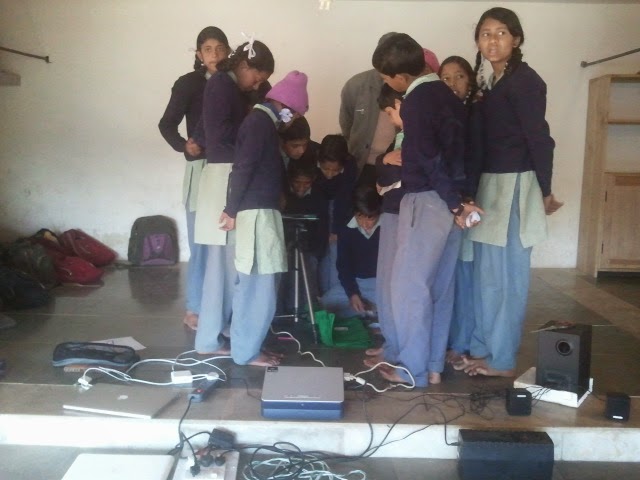If Mahatma Gandhi were alive today would there be no corruption in India? Would relations between India and Pakistan be better? Would he run a factory or spin the wheel? What impact did Mahatma Gandhi have in the Kumaon region? Did the Himalayas influence him?
These were some of the questions posed by 6th, 7th and 8th class students of Aarohi Bal Sansar, a school in village Satoli 30 km from Almora, at a recently concluded workshop on self-directed learning skill. The workshop was conducted by Atul during his almost month long trip to the Himalayas in June and July.
The workshop kicked off with a discussion on ‘what dispositions make Eklavya an Eklavya’? Students listed intrinsic motivation, determination, perseverance, focus and resilience as some of the traits of Eklayva (who is a great example of a self-directed learner*).
The students then created a newspaper on Mahatma Gandhi based on the questions they had earlier raised. In finding answers to these questions the students followed a process of ‘guided discovery’. They sought inputs from their teachers, from books in their library and searched the internet.
There were lively discussions on each article, which facilitated reflective learning, an essential element of self-directed learning. The students then played the role of editors and set parameters to judge the quality of articles they had written, which in turn decided which article should come on the first page, second page and so forth. The editorial criteria set by the students included – critical thinking, creativity, self-expression and narrative quality. The exercise culminated in the production of an 8-page broadsheet newspaper, which the students titled ‘Aarohi Reporter’.
At the start of the workshop on each of the four days Atul explained the big picture – how our economy is undergoing a phase change and computerization, mechanization, hyper connectivity and knowledge explosion are making the future very uncertain. More and more jobs are now better done by machines, computers and robots – like the bank tellers being replaced by ATM. In such an uncertain scenario ability to become a self-directed, lifelong learner, who yearns to constantly learn and reinvent becomes imperative.
It was also discussed how technology is opening up freelance opportunities like animators and programmers who can provide their services remotely to companies and organisations in India and abroad using the Internet. Talented individuals can set-up pollution free, low energy consuming, micro enterprises that are highly suitable to the Himalayan ecosystem while earning well and doing very creative work.
Cutting edge research on education psychology, like Carol Dweck’s work on Mindset and Angela Duckworth’s research on grit were explained to students in the form of interesting activities.
The workshop concluded with a fun activity – making stop motion animations, something Atul had introduced to the students when he had visited Aarohi Bal Sansar last December.
_______
*(In the Indian epic, Mahabharata, Eklavya is a tribal prince who, when denied archery training by the royal teacher Dronacharya, makes a clay model of the teacher and teaches himself archery. He becomes a great archer).
*(In the Indian epic, Mahabharata, Eklavya is a tribal prince who, when denied archery training by the royal teacher Dronacharya, makes a clay model of the teacher and teaches himself archery. He becomes a great archer).


